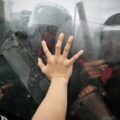COVID-19 vaccination among religious communities in Europe
COVID-19 vaccination among religious communities in Europe
While religion may be causing vaccine hesitancy in Europe, a closer look shows how public trust is playing a defining role in low vaccination rates.
Europe stands above the global COVID-19 vaccination rate, with 67.3%[1] of its population fully vaccinated compared to 46.6%[2] of the world population. Despite this, Europe remains, as the World Health Organization (WHO) warned yet again in November 2021, “at the epicentre”[3] of the COVID-19 pandemic. Cases, hospitalisations, and deaths continue to regularly soar across the continent. In other words, the stakes are high.
And yet, there are Europeans that continue to refuse vaccination. Eastern Europeans are particularly likely to refuse COVID-19 vaccines. Bulgaria, for example, recently made headlines for its bleak vaccination rates of only 26.2%, the lowest in Europe.[4] Other neighbouring countries with similarly low vaccination rates include Romania and Slovakia.[5]
Religion and low vaccination in Europe
One key reason why these countries have the lowest vaccination rates in Europe is the influence of religion. In Bulgaria, for example, the Orthodox Church has refused to endorse mass vaccination and instead pushed messages about the sacredness of the body of Christ. Similarly, the Orthodox Church is also on the “front lines”[6] of vaccine opposition in Romania. For example, Archbishop Teodosie Petrescu of Romania’s southern diocese of Tomis, publicly declared vaccines to be unsafe. Given the Romanian Orthodox Church holds sway over many parts of the country, Romania’s politicians have not openly questioned priests and bishops like Archbishop Petrescu.[7]
Religious opposition to vaccination has also appeared beyond Eastern Europe. A study of Orthodox Jewish mothers in London, for example, shows that in the face of the uncertainty about the efficacy or safety of the vaccines in general, many of them prefer to put their trust in God rather than science.[8] “When you don’t know what to do, when there’s a risk involved both ways, then there’s no need to put yourself in the danger of doing one of them. By not doing it (we) trust that God will help you out of these things.”[9]
But to say that religion directly affects COVID-19 vaccination among Europeans would be misleading. The global vaccine hesitancy survey by Johns Hopkins University shows that, most often, less than 5% of Europeans who may refuse the COVID-19 vaccine would do so because they see it against their religious beliefs.[10] In fact, the Netherlands, a northwestern European country, reports the highest proportion of people refusing vaccination due to religious beliefs, at 7%.[11] More perplexingly, the Netherlands is joined by neighbouring northwestern and western European countries, including Germany at 6%, where vaccine refusal due to religious beliefs is among the highest in Europe.[12]
Low public trust and vaccination in Europe
So why do religious communities, such as in Eastern Europe or the United Kingdom (UK), continue to refuse vaccination? Research shows that while those people with strong religious beliefs are less likely to be vaccinated than those who say they are less religious, there are other factors that play a role in the relationship between religion and vaccination.[13]
In the case of both Eastern Europe and the UK, evidence shows that religious communities have refused vaccines because of a distinct lack of trust in public institutions. University of Pennsylvania academics on Eastern Europe, Professors Kristen Ghodsee and Mitchell A. Orenstein, together argue that Eastern Europe’s low rates of vaccination are because of the lingering effects of decades of communist rule and its collapse.[14] After 1989, many of the region’s countries underwent deep post-communist recessions, and with it, a profound erosion of public trust.[15] This lack of public trust has not been reversed. It is not surprising that Bulgaria, Romania, and Slovakia – countries with the lowest vaccination rates in Europe – also have one of the lowest levels of trust in government, at 22%, 31%, and 21% respectively.[16]
In the case of vaccine-hesitant communities in the UK, the National Health Service (NHS) reports that most are hesitant not because of religious beliefs but because of their marked experiences as ethnic minorities. Black, South Asian, and Eastern European ethnic groups, all have high levels of vaccine refusals because of the lack of public trust driven by socio-economic inequities.[17] This was indeed confirmed in recent survey findings, which showed that only 36% of people from ethnic minority groups have a great deal of trust in the NHS – compared with 55% of white people who say the same.[18]
Not simply religion
Therefore, it can be argued that low vaccination rates among religious communities in Europe are not simply because of religion. To be sure, the majority of religious leaders and institutions across Europe, including Pope Francis and the Vatican, have encouraged vaccination rather than discouraged it. Those who have discouraged vaccination are a minority, but one which has gained disproportionate traction with the help of other factors, particularly the lack of public trust.
Sources
[1] COVID-19 Vaccine Tracker | European Centre for Disease Prevention and Control
[2] Coronavirus (COVID-19) Vaccinations – Statistics and Research – Our World in Data
[3] Covid: WHO warns Europe once again at epicentre of pandemic – BBC News
[4] Why Bulgaria’s COVID-19 jab rate is the lowest in Europe
[5] COVID-19 Vaccine Tracker | European Centre for Disease Prevention and Control
[6] Pandemic of anti-vaxxers and COVID deniers hits Romania
[7] Pandemic of anti-vaxxers and COVID deniers hits Romania
[8] Perceptions of childhood immunization in a minority community: qualitative study – Lesley Henderson, Christopher Millett, Nicki Thorogood, 2008
[9] Perceptions of childhood immunization in a minority community: qualitative study – Lesley Henderson, Christopher Millett, Nicki Thorogood, 2008
[10] COVID Behaviors Dashboard
[11] COVID Behaviors Dashboard
[12] COVID Behaviors Dashboard
[13] Is stronger religious faith associated with a greater willingness to take the COVID-19 vaccine? Evidence from Israel and Japan | SpringerLink
[14] Why Won’t Eastern Europeans Get Vaccinated? by Kristen Ghodsee & Mitchell A. Orenstein – Project Syndicate
[15] Why Won’t Eastern Europeans Get Vaccinated? by Kristen Ghodsee & Mitchell A. Orenstein – Project Syndicate
[16] Why Won’t Eastern Europeans Get Vaccinated? by Kristen Ghodsee & Mitchell A. Orenstein – Project Syndicate






